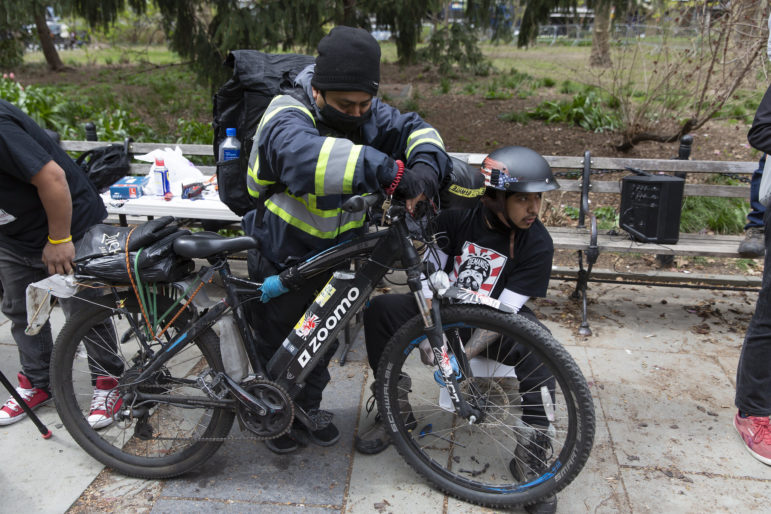“We aren’t helping delivery workers by forcing them to charge unsafe, unregulated equipment in their apartments. We need more regulation to protect these hard-working riders and their neighbors, not less.”

John McCarten/NYC Council Media Unit
Food delivery workers, pictured here at a 2022 press conference with City councilmembers, often rely on e-bikes to get around.There was another e-bike battery fire last weekend. We’ve seen variations of this dozens of times before in New York City. This time someone was charging five e-bikes in an apartment on the 20th floor of a high rise in Midtown. As happened almost 200 times in the past year, the batteries exploded. Almost 50 people were injured and multiple families are now homeless. The FDNY had to perform a daring rope rescue to save a woman dangling out of a window. It was a miracle no one died.
New Yorkers climbing out of their windows to escape battery fires is becoming a more regular occurrence. Less than a year ago, there was a fire in a NYCHA building in the East Village where two teens had to climb down a fifth floor drainpipe to escape. In response to that deadly fire, and another a few months later in the Jackie Robinson Houses, NYCHA proposed an all out ban on e-bikes and e-scooters in their buildings.
This was met with furor from politicians and pundits who were quick to criticize the policy as overreaching, but without offering any workable suggestions on how to stop the fires. NYCHA backed down a few weeks later, saying they needed to do more research into possible alternatives. Nothing to date has been proposed instead. If you walk around the Riis Projects, as I’ve done recently, e-bikes are all over the hallways and being brought up in elevators. There isn’t even a warning sign up anywhere.
On Monday, there is an e-bike battery oversight hearing in the City Council with some common sense proposals on how to deal with the battery fire epidemic. One proposed bill calls for a battery safety publicity campaign, another calls for a ban on used battery sales, and another calls for a ban on the sales of e-bike batteries without a safety certification. None of these bills seem to be getting any traction though, probably because council members are under the mistaken impression that increasing regulation on e-bike batteries is somehow anti-immigrant, anti-worker, or anti-biking.
I don’t agree with that at all. The people most affected by e-bike fires are often the families of the delivery riders or their neighbors, who live in some of the poorest neighborhoods of the city. Every time there is a fire, multiple families are displaced, sometimes with no place to go. We aren’t helping delivery workers by forcing them to charge unsafe, unregulated equipment in their apartments. We need more regulation to protect these hard-working riders and their neighbors, not less.
A long term solution is to set up a battery swap network of charging kiosks throughout the city that enables riders to swap their batteries for charged ones for a monthly subscription fee. We are in the early stages of building just such a network of safe swappable batteries. Even better, we are building this swap network so seniors on mobility scooters can use the batteries as well.
When this network is set up, home charging in apartment buildings will be a thing of the past, and seniors will be more mobile, allowing them full access to the city’s parks and other attractions. Heck, we even have some people using our network who are making extra money doing delivery on mobility scooters.
The City Council shouldn’t wait for us to finish this network to start passing battery safety regulations. It’s time to start passing battery safety laws now.
Baruch Herzfeld, a father of four, lives in Crown Heights, Brooklyn. He enjoys transporting his 4-year-old triplets to school on an electric cargo bike and playing ball with his eldest son. He is the CEO of Popwheels, a Brooklyn based startup, building a citywide e-bike and mobility scooter battery swap network.








